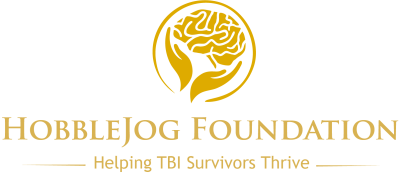Susan M. Hahn, founder and president of the HobbleJog Foundation, a Maryland-based nonprofit supporting teens and young adults recovering from neurological trauma, presented the nonprofit’s first-ever grant to help fund LifeBridge Health’s RETURN! Brain Injury Community Re-Entry Program. A check in the amount of $10,000 was
presented today to Neil Meltzer, CEO of LifeBridge Health, along with members of the organization’s Brain Injury Services of Sinai Hospital team. Hahn said, “We are very pleased to support the RETURN! program, as it aligns directly with HobbleJog’s mission.”
A Traumatic Brain Injury (TBI) survivor and two-time Iron Girl triathlete, Hahn suffered a near-death experience after being hit by a car while walking her bike across a highway in 2013. Following 12 months of hospitalization, in-patient rehabilitation and outpatient therapies, she was released from care. However, she realized that symptoms from the brain injury continued and that experience lead to her exploration of resources and services for TBI sufferers who need longer-term rehabilitation. In July 2016, Hahn formed HobbleJog Foundation with a focus on supporting the uniquely vulnerable population of adolescents and young adults with brain injuries. Hahn emphasizes, “You can’t see a brain injury. People around you do not know you are struggling– possibly struggling more than ever before in your life. When casts come off your arms and legs, that does not mean the symptoms of the brain injury have gone away.”
Mark Huslage, LCSW-C, CBIST, Coordinator of Brain Injury Programs, LifeBridge Health, said, "The RETURN! Brain Injury Program at Sinai Rehabilitation Center is honored to be the first recipient of the HobbleJog Foundation Grant. This generous award will help establish the iPad Initiative, a program which uses Apple technology and selected applications to help RETURN! clients compensate for challenges in their memory and organizational skills. HobbleJog grant monies will be used to pay for both iPads and applications for young adults admitted into RETURN!. All of us here involved with RETURN! are grateful to HobbleJog Foundation President Susan Hahn for both her generosity to us and the Maryland brain injury community. HobbleJog on!"
The RETURN! program, part of Brain Injury Services of Sinai Hospital, provides participants with a variety of strategies and resources to help them cope with various TBI challenges. A new highlight of the program provides participants with a suite of electronic apps, known as the BEST Suite, proven to improve time management, memory, energy, decision-making and self- regulation—some of the most common challenges for brain injury survivors. Many users of these apps consider them “essential cognitive prosthetics.” Patients learn how to maximize the benefits of the apps while participating in the day treatment program. [See “About BEST Suite” below for details.] For patients who do not own handheld electronic devices to operate the apps, HobbleJog Foundation’s grant will fund the purchase of iPads.
About HobbleJog Foundation Founded in 2016, Maryland-based HobbleJog Foundation was formed to provide support for teens and young adults recovering from neurological trauma, inspiring them to reach their full potential. The foundation provides funding to qualified organizations to assist them in achieving their goals for support services to designated individuals.
About LifeBridge Health LifeBridge Health is comprised of Sinai Hospital, Northwest Hospital, Carroll Hospital, Levindale Hebrew Geriatric Center and Hospital, and subsidiaries and affiliated units, including LifeBridge Health & Fitness. Sinai, Northwest and Carroll hospitals are acute-care general hospitals with complementary clinical centers of excellence. For more information, visit www.lifebridgehealth.org.
About BEST Suite Many individuals struggle with goal-setting, self-regulation, and energy conservation/fatigue management as they transition and adapt to life after a brain injury. These difficulties often cause loss of self-esteem and confidence as well as put strain on relationships with caregivers. The BEST Suite of apps helps with these daily challenges.

My son had a tbi in 2016. He has terrible anxiety.
He cannot attend school. Do u have anyone who
Could go with him for support or be able to get him a therapy dog.?
Hi Judy,
Sorry for the delay in responding to this. We have quite a few resources that you might find helpful. We will reach out to you via email and provide them to you.
Awesome! Its genuinely remarkable post, I have got much clear idea regarding from this post